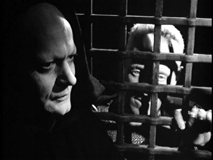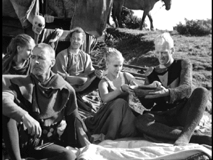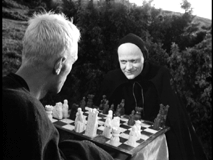The Seventh Seal (Ingmar Bergman) 1957
 Easily, one of the greatest films ever made, The Seventh Seal, Ingmar
Bergmanís towering allegory about the human condition, seems at once utterly
timeless and acutely aware of the world that it takes place in. Set in
14th-century Sweden, the movie takes place in a medieval land thatís being
torn apart by the Crusades and the Plague, but it focuses just as intently on
the fleeting moments of happiness that its characters feel as the disasters that
they face. Within minutes of its opening, the movie casts itself into a realm of
abstraction, trotting out Death itself as a main character, and this distance
from reality enables it to look more directly at its philosophical question,
which is, basically, ďWhat if there is no God?Ē A variety of answers are
offered up to this question, through the reactions of the diverse assortment of
characters that populates the film, and each of them is parlayed with enough
conviction from the actor delivering it that it feels as convincing and right as
the last. As in many of Bergmanís films, itís fairly impossible to find a
definitive surrogate for the director, since each character is both sympathetic
and pitiable.
Easily, one of the greatest films ever made, The Seventh Seal, Ingmar
Bergmanís towering allegory about the human condition, seems at once utterly
timeless and acutely aware of the world that it takes place in. Set in
14th-century Sweden, the movie takes place in a medieval land thatís being
torn apart by the Crusades and the Plague, but it focuses just as intently on
the fleeting moments of happiness that its characters feel as the disasters that
they face. Within minutes of its opening, the movie casts itself into a realm of
abstraction, trotting out Death itself as a main character, and this distance
from reality enables it to look more directly at its philosophical question,
which is, basically, ďWhat if there is no God?Ē A variety of answers are
offered up to this question, through the reactions of the diverse assortment of
characters that populates the film, and each of them is parlayed with enough
conviction from the actor delivering it that it feels as convincing and right as
the last. As in many of Bergmanís films, itís fairly impossible to find a
definitive surrogate for the director, since each character is both sympathetic
and pitiable.
 Every
scene seems to be balanced delicately between comedy and drama, and in the best
scenes (the confession to Death, the confrontation of the priest turned
grave-robber) each line of dialogue seems to change what the scene is trying to
say. The theme moves from anger, to revenge, to lust, to freedom, to fear, to
forgiveness, from second to second. You realize what it's trying to do, and
succeeding at, is saying all of those things about people at once. Its
optimistic and droll moments are all the more impressive because they come after
people stare into the abyss. The impending end of the world seems no reason not
to keep oneís chin up. Perhaps even more impressively, it shows that the
desire to search for answers here doesn't preclude being afraid that the answer
might not be what one hoped. The reaction of a knight (a brilliant Max von Sydow)
and his squire (Gunnar Bjornstrand) to spiritual disappointment is contrasted
most tragically against that of an angry mob that burns an innocent girl,
claiming she is a witch. The power of this harrowing scene is reduced in no way
by the shenanigans that surround it, nor the impression that Judgment Day is
just around the corner anyway.
Every
scene seems to be balanced delicately between comedy and drama, and in the best
scenes (the confession to Death, the confrontation of the priest turned
grave-robber) each line of dialogue seems to change what the scene is trying to
say. The theme moves from anger, to revenge, to lust, to freedom, to fear, to
forgiveness, from second to second. You realize what it's trying to do, and
succeeding at, is saying all of those things about people at once. Its
optimistic and droll moments are all the more impressive because they come after
people stare into the abyss. The impending end of the world seems no reason not
to keep oneís chin up. Perhaps even more impressively, it shows that the
desire to search for answers here doesn't preclude being afraid that the answer
might not be what one hoped. The reaction of a knight (a brilliant Max von Sydow)
and his squire (Gunnar Bjornstrand) to spiritual disappointment is contrasted
most tragically against that of an angry mob that burns an innocent girl,
claiming she is a witch. The power of this harrowing scene is reduced in no way
by the shenanigans that surround it, nor the impression that Judgment Day is
just around the corner anyway.
 Bergman touches on nearly every one of his major themes in The Seventh Seal,
and if he might have elaborated on many of them better elsewhere, I'm not sure
that he's ever made such a comprehensive, watchable flick as this one. Manís
self-destructive search for answers is made literally apocalyptic here, but
itís also made apparent that itís wholly necessary if any meaning is to be
found. The complexities that the film offers up as answers seem to hold
fragments of universal truth, but nothing definitive, and in that haziness lays
the movieís truest wisdom. The blunt insistence of Death (the unforgettable
Bengt Ekerot) that the game of life must come to an end frustrates most since,
thanks to the supreme intelligence of the script, we felt we were on the right
path, even if still havenít figured it all out. The movieís ultimate message
is not to look for definitive answers, since nothing is guaranteed to remain as
might originally appear. Even inevitable death is a disappointing anticlimax
here, since it doesnít bestow the expected enlightenment with its coming. The
serendipitous joys found in the moment are most important in this context
because they make no demands and carry with them no expectation. That
surprisingly life-affirming message is the one thing in The Seventh Seal
that endures long after its striking images of death and decay fade from the
mind.
Bergman touches on nearly every one of his major themes in The Seventh Seal,
and if he might have elaborated on many of them better elsewhere, I'm not sure
that he's ever made such a comprehensive, watchable flick as this one. Manís
self-destructive search for answers is made literally apocalyptic here, but
itís also made apparent that itís wholly necessary if any meaning is to be
found. The complexities that the film offers up as answers seem to hold
fragments of universal truth, but nothing definitive, and in that haziness lays
the movieís truest wisdom. The blunt insistence of Death (the unforgettable
Bengt Ekerot) that the game of life must come to an end frustrates most since,
thanks to the supreme intelligence of the script, we felt we were on the right
path, even if still havenít figured it all out. The movieís ultimate message
is not to look for definitive answers, since nothing is guaranteed to remain as
might originally appear. Even inevitable death is a disappointing anticlimax
here, since it doesnít bestow the expected enlightenment with its coming. The
serendipitous joys found in the moment are most important in this context
because they make no demands and carry with them no expectation. That
surprisingly life-affirming message is the one thing in The Seventh Seal
that endures long after its striking images of death and decay fade from the
mind.
* * * * Masterpiece
05-24-02
Jeremy Heilman